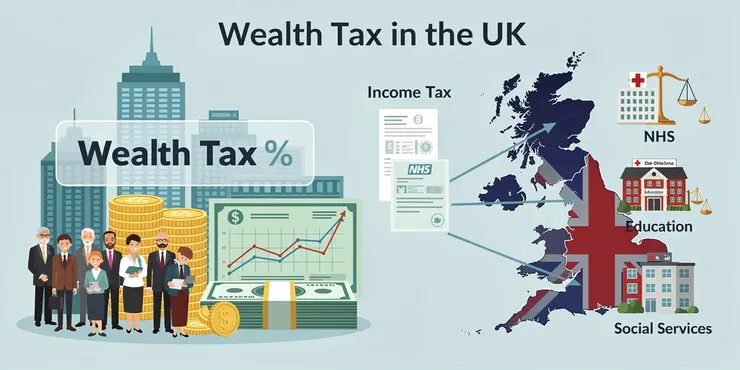
Find Help
More Items From Ergsy search
-

What is a Wealth Tax?
Relevance: 100%
-

What is the Wealth Tax in the UK?
Relevance: 96%
-

What is the objective of a wealth tax?
Relevance: 96%
-

What is the wealth tax in the UK?
Relevance: 96%
-

Could a wealth tax encourage tax avoidance?
Relevance: 95%
-

Would a wealth tax replace other taxes in the UK?
Relevance: 93%
-

Can a wealth tax be levied annually?
Relevance: 93%
-

How is a wealth tax typically calculated?
Relevance: 93%
-

Who is typically subject to a wealth tax?
Relevance: 92%
-

What are the challenges of implementing a wealth tax?
Relevance: 92%
-

How does a wealth tax differ from an income tax?
Relevance: 91%
-

What are the administrative costs of a wealth tax?
Relevance: 91%
-

Are there any countries currently implementing a wealth tax?
Relevance: 90%
-

What are common arguments in favor of a wealth tax?
Relevance: 90%
-

Can a wealth tax impact economic behavior?
Relevance: 90%
-

Has the UK ever had a wealth tax?
Relevance: 90%
-

Why doesn't the UK have a wealth tax?
Relevance: 90%
-

What arguments are made for a wealth tax in the UK?
Relevance: 89%
-

Is real estate included in wealth tax calculations?
Relevance: 89%
-

Would a wealth tax apply to foreign assets?
Relevance: 89%
-

How do economists view the impact of wealth taxes?
Relevance: 87%
-

How do other countries implement a wealth tax?
Relevance: 87%
-

How might a wealth tax impact inequality in the UK?
Relevance: 87%
-

Could a wealth tax affect economic growth in the UK?
Relevance: 87%
-

How might a wealth tax affect wealthy individuals?
Relevance: 87%
-

Has any political party in the UK supported a wealth tax?
Relevance: 85%
-

How do governments ensure compliance with wealth tax laws?
Relevance: 84%
-

How does council tax relate to wealth in the UK?
Relevance: 79%
-

What are common criticisms of a wealth tax?
Relevance: 65%
-

Are there alternatives to a wealth tax for addressing inequality?
Relevance: 65%
-

What taxes in the UK target wealth?
Relevance: 64%
-

Do wealth taxes differ between countries?
Relevance: 63%
-

What exemptions are commonly associated with wealth taxes?
Relevance: 62%
-

What types of assets are typically subject to a wealth tax?
Relevance: 60%
-

Has the idea of a wealth tax been discussed in political debates?
Relevance: 58%
-

Do public opinion polls support a wealth tax in the UK?
Relevance: 57%
-

Are there professional advisors for inheritance tax planning?
Relevance: 48%
-

Is there a proposal for a wealth tax in the UK?
Relevance: 46%
-

What is Inheritance Tax?
Relevance: 45%
-

Is there a difference between inheritance tax and estate tax?
Relevance: 44%
Introduction to Wealth Tax
A wealth tax is a levy on the total value of personal assets, including property, cash, bank deposits, shares, fixed assets, and pension plans beyond a certain threshold. Unlike income tax, which is based on earnings, a wealth tax targets the value of owned assets. This kind of taxation is designed to reduce economic inequality and generate revenue from individuals with substantial holdings.
How Wealth Tax Works
A wealth tax is typically assessed on an annual basis. Tax authorities evaluate the market value of an individual's or household’s net wealth and apply a tax rate accordingly. The rate can be flat or progressive. In the UK context, implementing a wealth tax would involve identifying liable individuals, valuing their assets accurately, and setting a fair tax rate. For instance, a person owning multiple properties with a significant combined value might pay a percentage based on their total asset valuation.
Arguments for Wealth Tax
Proponents argue that a wealth tax can address income inequality by redistributing wealth within society. It can also serve as an additional revenue stream for government spending on public services such as healthcare and education. In the UK, where wealth disparity is a growing concern, a wealth tax might help bridge the gap between rich and poor. Advocates believe it could discourage the hoarding of wealth and foster economic opportunity and fairness.
Arguments Against Wealth Tax
Critics of the wealth tax highlight potential challenges, such as difficulties in effectively valuing assets and possible capital flight, where wealthy individuals move their assets or themselves to avoid taxation. In addition, there may be concerns over double taxation, where asset-generated income has already been taxed via other means, such as income tax or capital gains tax. In the UK, opponents argue that such a tax could harm investment and entrepreneurship.
Examples of Wealth Tax in Other Countries
Various countries have implemented wealth taxes with mixed outcomes. For example, France had a wealth tax known as the “Impôt de Solidarité sur la Fortune,” which was eventually replaced by a tax on real estate. Scandinavian countries like Norway and Switzerland have successfully maintained wealth taxes with relatively low rates. Each country’s approach reflects its specific economic and social objectives, offering insights into potential applications in the UK.
Conclusion
The introduction of a wealth tax in the UK remains a matter of debate, balancing between promoting social equity and ensuring economic vibrancy. While it offers a potential solution to wealth concentration, the implementation details, such as tax thresholds and enforcement mechanisms, are critical to its effectiveness and fairness. Policymakers need to weigh the positives against possible drawbacks when considering whether a wealth tax is suitable for the UK's unique economic landscape.
Introduction to Wealth Tax
A wealth tax is a kind of tax on what people own. This includes houses, money in the bank, shares, and other valuables. People with a lot of valuable things might have to pay this tax. This is different from income tax, which is paid on the money you earn. The wealth tax is meant to help make things fairer by collecting money from richer people to help society.
How Wealth Tax Works
Usually, wealth tax is checked and collected every year. The government looks at how much all the things a person or a family owns are worth in today’s market. Then, they decide how much tax to charge. They can charge the same rate for everyone or increase the rate for richer people. If the UK wants a wealth tax, the government will need to decide who should pay it, find out how much their things are worth, and set a fair tax rate. For example, if a person owns many houses, they might pay a bit of tax based on how much their houses are worth together.
Arguments for Wealth Tax
Some people think wealth tax is good because it can help make things fairer. It can make sure rich people help pay for things everyone uses, like hospitals and schools. In the UK, some people are much richer than others, and a wealth tax might help make it fairer. People who like wealth tax also think it can stop rich people from keeping too much money to themselves and give everyone a better chance.
Arguments Against Wealth Tax
Other people think wealth tax is not a good idea. They say it can be hard to know exactly how much things are worth. Some rich people might move their money or themselves to another country to avoid this tax. Also, some think it is unfair to tax things again when the money they make has already been taxed before. In the UK, some people worry that a wealth tax could stop people from investing money or starting new businesses.
Examples of Wealth Tax in Other Countries
Many countries have tried wealth taxes, with different results. For example, France had a wealth tax, but later changed it to focus on taxing property. Countries like Norway and Switzerland still have wealth taxes with low rates. Each country does it differently, based on what they need, and looking at these examples can help decide if this tax would work in the UK.
Conclusion
Deciding to have a wealth tax in the UK is still being talked about. The government needs to decide if it will help make things fairer or cause problems. If they choose to have it, they need to think carefully about how it will work. They have to make sure the rules are fair for everyone. It’s important to look at all the good and bad sides before making a decision about wealth tax in the UK.
Frequently Asked Questions
What is a wealth tax?
A wealth tax is a tax based on the market value of assets owned by an individual. It includes financial assets like stocks and bonds, and real assets like real estate.
How does a wealth tax differ from an income tax?
An income tax is levied on the earnings of an individual or business, while a wealth tax is levied on the total value of owned assets.
Who is typically subject to a wealth tax?
Wealth taxes generally target high-net-worth individuals who own assets exceeding a certain threshold.
What is the objective of a wealth tax?
The objective is often to reduce wealth inequality by redistributing wealth from the rich and generating government revenue.
Are there any countries currently implementing a wealth tax?
Yes, some countries, such as Spain and Switzerland, have forms of wealth taxes in place.
What are common arguments in favor of a wealth tax?
Proponents argue that it reduces inequality, raises government revenue, and can discourage hoarding of wealth.
What are common criticisms of a wealth tax?
Critics argue it can lead to capital flight, is difficult to administer, and may ultimately reduce savings and investments.
How is a wealth tax typically calculated?
It is usually calculated as a percentage of the net value of assets owned, above a specified exemption level or threshold.
Is real estate included in wealth tax calculations?
Yes, real estate is typically included as part of the taxable wealth of an individual.
Do wealth taxes differ between countries?
Yes, wealth tax structures, rates, exemptions, and thresholds can vary significantly between countries.
What types of assets are typically subject to a wealth tax?
Typical assets include real estate, bank deposits, stocks, bonds, and business ownership interests.
Can a wealth tax impact economic behavior?
Yes, it can influence decisions on investment, consumption, and savings, possibly leading to changes in economic behavior.
What exemptions are commonly associated with wealth taxes?
Exemptions often include certain levels of wealth, primary residences up to a certain value, and some personal goods.
How do governments ensure compliance with wealth tax laws?
Governments may conduct audits, require asset disclosures, and impose penalties for non-compliance.
Can a wealth tax be levied annually?
Yes, wealth taxes are typically levied on an annual basis, based on the value of assets at a specific date.
How do economists view the impact of wealth taxes?
Economists are divided; some see it as a solution for inequality, while others worry about its economic downsides.
Has the idea of a wealth tax been discussed in political debates?
Yes, the wealth tax has been a popular topic in political debates, especially in countries facing fiscal challenges or high inequality.
What challenges do governments face in implementing a wealth tax?
Challenges include accurately valuing assets, preventing tax evasion, and addressing legal and logistical complexities.
How might a wealth tax affect wealthy individuals?
It could reduce net returns on investments, incentivize asset dispersal, or encourage moves to jurisdictions without wealth taxes.
Are there alternatives to a wealth tax for addressing inequality?
Alternatives include progressive income taxes, estate taxes, capital gains taxes, and increased social welfare spending.
What is a wealth tax?
A wealth tax is money that some people pay to the government. This tax is based on the value of things they own, like houses, cars, and savings.
If you find this hard to understand, you can use tools that read out loud or ask someone to explain it more.
A wealth tax is a tax on what you own. It looks at how much your things are worth. This can be money items like stocks and bonds, and physical items like houses or land.
If you're finding this hard, don't worry! Tools like text-to-speech can help by reading text out loud for you. You can also use apps that highlight words as they are read, making it easier to follow along.
What is the difference between a wealth tax and an income tax?
A wealth tax is money you pay on things you own, like a house or car.
An income tax is money you pay on the money you earn from your job.
To help understand better, you can use pictures or charts. Talking to someone who knows about taxes can also help.
Income tax is money you pay on the money you earn from work or a business. Wealth tax is money you pay based on how much your things, like a house or savings, are worth.
To help understand, you can use pictures or videos to explain these taxes. Writing things down in a list can also help. A friend, a teacher, or a parent can help too.
Who usually pays a wealth tax?
A wealth tax is something that people with a lot of money may have to pay. This means people who own valuable things like big houses, expensive cars, or have a lot of money saved up.
Here are some tips to help understand this:
- Read slowly: Take your time with each word.
- Ask for help: Talk to someone if you're unsure.
- Look at pictures: Try to find pictures of houses or cars to help visualize what "wealth" means.
Wealth taxes are for people who have a lot of money and things. These people have more than a set amount of valuable things.
What is a wealth tax for?
A wealth tax means rich people pay money from their total money and stuff.
This tax helps share money around.
It is used to help people who need it.
Tools like picture stories can help learn more.
The goal is to make things fair by taking some money from rich people and giving it to the government. This can help everyone have more equal amounts of money.
Which countries have a tax on wealth right now?
Yes, some places like Spain and Switzerland have taxes for people with a lot of money.
Why do some people think a wealth tax is a good idea?
Some people think it helps make things fairer, gives the government more money, and stops people from keeping all their money to themselves.
Why do some people not like a wealth tax?
A wealth tax is when rich people pay money on what they own. Some people don't like it. Here are some reasons why:
- They say it's unfair to take more money from rich people.
- Some people think rich people will hide their money to pay less tax.
- It might be hard to know how much some things are worth.
If you're reading about this, it might help to:
- Ask someone to explain any hard words.
- Use online tools to read the text out loud.
- Take notes to remember the important parts.
Some people think it can make money leave the country. It can be hard to manage. It might make people save and invest less money.
How do you usually work out a wealth tax?
This number shows what part of your things or money is used. It is a small bit of what you own. You don't count a part you don't have to pay for.
Is property counted in wealth tax?
Yes, houses and land are usually part of what a person pays taxes on.
Are wealth taxes different in each country?
Yes, different countries have different rules for taxes on wealth. This means they have different ways to decide how much tax you pay, what money is not taxed, and when you start paying taxes.
What things do people pay a money tax on?
Common things people own are houses, money in the bank, shares in companies, loans to others, and parts of businesses.
Does a tax on rich people's money change how they spend it?
This question asks if taking some money from rich people can make them spend or save their money in different ways.
Support tools like simple charts or pictures can help explain this. Talking with someone about the question can make it easier to understand.
Yes, it can change how people use and save money. This might make the economy act differently.
What things are often not taxed with wealth taxes?
Sometimes, people don't have to pay tax on certain things. This can happen if:
-You don't have a lot of money.
-Your home is not worth too much money.
-You own personal items that are not too expensive.
For help, you can use books with pictures, or ask someone to explain things to you.
How do governments make sure people follow wealth tax rules?
Governments can do checks, ask for a list of things people own, and give punishments if rules are not followed.
Can the government ask rich people for money every year?
Yes, people usually pay wealth taxes every year. These taxes are based on how much their things are worth on a certain date.
What do money experts think about wealth taxes?
Money experts are people who study money and how it works. They think about what happens when there is a wealth tax. A wealth tax is when the government takes a little bit of money from rich people. This helps pay for things like schools and roads.
Some money experts think wealth taxes are good. They say it helps everyone have more fair chances. Other experts think they might make people not want to work as much.
If you want help to understand this, you can:
- Ask someone to read it with you.
- Use a computer or phone to hear it read out loud.
- Look up new words to understand them better.
Experts don't all agree. Some think it can help make things fairer for everyone. Others worry it might cause money problems.
Do people talk about a wealth tax in politics?
Yes, sometimes people in the government talk about a "wealth tax." A wealth tax is when rich people pay extra money to the government.
Some people think it is a good idea. They say it helps the government have more money to help everyone.
Other people think it is a bad idea. They say it might make rich people want to leave the country.
If you want to learn more, you can ask someone to explain or use a website that helps you understand money topics.
Yes, people talk a lot about wealth tax. It is important in politics, especially when countries have money problems or when there is a big gap between rich and poor.
What problems do governments have with a wealth tax?
Governments have some problems when they try to use a wealth tax. Here are a few:
- Finding out exactly how much money and assets a person has. This can be hard because people have money and things in many places.
- Making sure everyone pays the right amount. Some people might try to hide their money.
- Explaining to people why a wealth tax is important. Some people might not like it and think it's unfair.
Using tools like picture aids, simple charts, or videos can help in understanding more about wealth tax.
The hard parts are figuring out how much things are worth, stopping people from not paying taxes, and solving tricky rules and planning problems.
What happens to rich people if there is a tax on their money?
When a government decides to take some money from very rich people, we call this a 'wealth tax'.
This means rich people have to give some of their money to help pay for things everyone needs. For example, roads and schools.
This might mean rich people have less money to spend.
Some rich people might not like this. But the tax helps make sure everyone has what they need.
To understand more, you can use picture stories or simple charts. These can help show how taxes work.
This could mean people earn less money from their savings, make them want to spread out their money in different places, or move their money to places without these taxes.
Are there other ways to help make money more fair?
Here are some other ways to get money for the country:
- Make people with higher incomes pay more taxes.
- Make taxes when someone passes down money or property to others.
- Make taxes when people sell things like stocks for a profit.
- Use more money to help people who need it with things like healthcare and food.
Tools that can help understand this better are picture diagrams or talking with a helper who can explain things step-by-step.
Useful Links
This website offers general information and is not a substitute for professional advice.
Always seek guidance from qualified professionals.
If you have any medical concerns or need urgent help, contact a healthcare professional or emergency services immediately.
Some of this content was generated with AI assistance. We’ve done our best to keep it accurate, helpful, and human-friendly.
- Ergsy carfully checks the information in the videos we provide here.
- Videos shown by Youtube after a video has completed, have NOT been reviewed by ERGSY.
- To view, click the arrow in centre of video.
- Most of the videos you find here will have subtitles and/or closed captions available.
- You may need to turn these on, and choose your preferred language.
- Go to the video you'd like to watch.
- If closed captions (CC) are available, settings will be visible on the bottom right of the video player.
- To turn on Captions, click settings .
- To turn off Captions, click settings again.
More Items From Ergsy search
-

What is a Wealth Tax?
Relevance: 100%
-

What is the Wealth Tax in the UK?
Relevance: 96%
-

What is the objective of a wealth tax?
Relevance: 96%
-

What is the wealth tax in the UK?
Relevance: 96%
-

Could a wealth tax encourage tax avoidance?
Relevance: 95%
-

Would a wealth tax replace other taxes in the UK?
Relevance: 93%
-

Can a wealth tax be levied annually?
Relevance: 93%
-

How is a wealth tax typically calculated?
Relevance: 93%
-

Who is typically subject to a wealth tax?
Relevance: 92%
-

What are the challenges of implementing a wealth tax?
Relevance: 92%
-

How does a wealth tax differ from an income tax?
Relevance: 91%
-

What are the administrative costs of a wealth tax?
Relevance: 91%
-

Are there any countries currently implementing a wealth tax?
Relevance: 90%
-

What are common arguments in favor of a wealth tax?
Relevance: 90%
-

Can a wealth tax impact economic behavior?
Relevance: 90%
-

Has the UK ever had a wealth tax?
Relevance: 90%
-

Why doesn't the UK have a wealth tax?
Relevance: 90%
-

What arguments are made for a wealth tax in the UK?
Relevance: 89%
-

Is real estate included in wealth tax calculations?
Relevance: 89%
-

Would a wealth tax apply to foreign assets?
Relevance: 89%
-

How do economists view the impact of wealth taxes?
Relevance: 87%
-

How do other countries implement a wealth tax?
Relevance: 87%
-

How might a wealth tax impact inequality in the UK?
Relevance: 87%
-

Could a wealth tax affect economic growth in the UK?
Relevance: 87%
-

How might a wealth tax affect wealthy individuals?
Relevance: 87%
-

Has any political party in the UK supported a wealth tax?
Relevance: 85%
-

How do governments ensure compliance with wealth tax laws?
Relevance: 84%
-

How does council tax relate to wealth in the UK?
Relevance: 79%
-

What are common criticisms of a wealth tax?
Relevance: 65%
-

Are there alternatives to a wealth tax for addressing inequality?
Relevance: 65%
-

What taxes in the UK target wealth?
Relevance: 64%
-

Do wealth taxes differ between countries?
Relevance: 63%
-

What exemptions are commonly associated with wealth taxes?
Relevance: 62%
-

What types of assets are typically subject to a wealth tax?
Relevance: 60%
-

Has the idea of a wealth tax been discussed in political debates?
Relevance: 58%
-

Do public opinion polls support a wealth tax in the UK?
Relevance: 57%
-

Are there professional advisors for inheritance tax planning?
Relevance: 48%
-

Is there a proposal for a wealth tax in the UK?
Relevance: 46%
-

What is Inheritance Tax?
Relevance: 45%
-

Is there a difference between inheritance tax and estate tax?
Relevance: 44%


